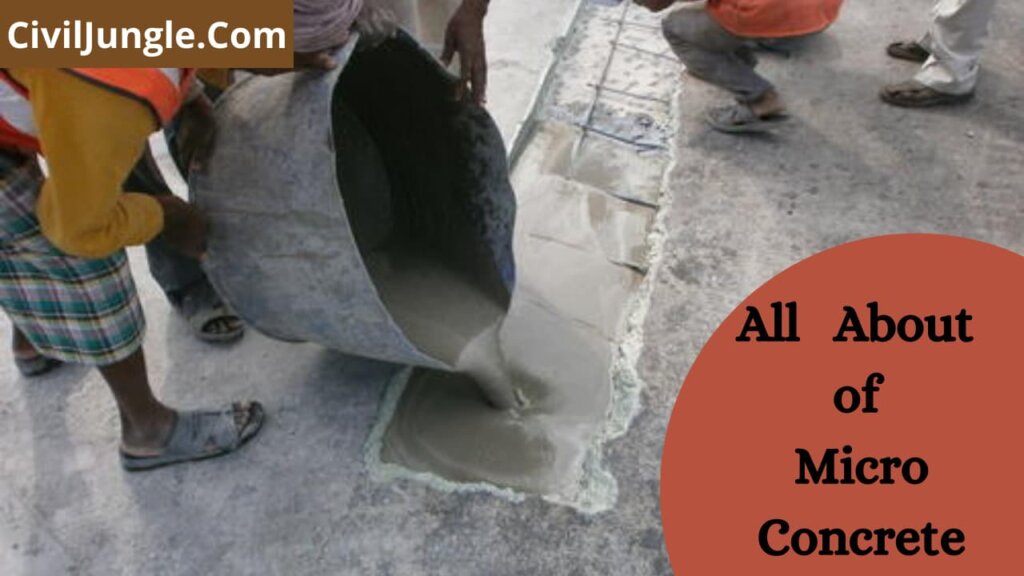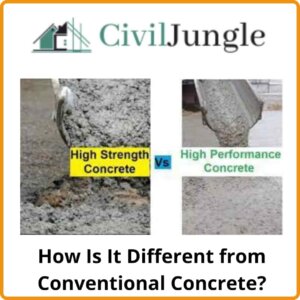
What Is Micro Concrete?
Micro concrete is a cement-based coating that is used as a thin layer on different surfaces like tiles, wood, etc to give a look and feel of real concrete at less cost. The layer of micro concrete is about 2-3mm thick.
It is a non-shrink and flowable material that only requires water to produce a high-strength concrete that gains maximum strength in less time.
It is widely used in bathrooms, kitchens, and floors as it is mould-free, stain-free, hygienic, waterproof, and anti-slip material.
Micro concrete is a great option to repair the cracks of cement walls at a very less price and weight compared to real concrete.
How Is It Different from Conventional Concrete?

Micro concrete has some special features that differ from regular concrete. Some of them are described below-
1. Easy to Handle and Place
Unlike conventional concrete, It doesn’t need skilled labor or any machine to prepare and place as it is available in prepackaged mix condition.
On the site, concrete mixing is not required hence human error problems are solved and in any environment, if faux finishing of concrete is required, micro concrete is the best surface material.
Regular concrete needs a mini excavator to dig 4-6inches before pouring the concrete but in the case of micro concrete, it doesn’t need any digging. So at the time of revamping the house when walls will be needed to excavate, it will be accessible more.
2.Less Water Demand
Micro concrete doesn’t require much water to mix rather it is made in such a way to reduce the demand for water as compared to regular concrete.
To prepare micro concrete, the water and concrete ratio required is 1:8. In the case of micro concrete, Pumping is not needed so heavy machinery is not required.
Thus it reduces the cost. After drying, micro concrete is waterproof where regular concrete is not.
3. Dries Up Fast
Unlike regular concrete, micro concrete dries very quickly, so the covered surface becomes functional within a day. Hence designers like micro concrete so much that waiting for several days is not needed.
For this feature of micro concrete, where the project is to be done in a short time where work disruption is not allowed, micro concrete is the best option.
How to Apply Micro Concrete?

Micro concrete doesn’t require any specially skilled labour or any machine to apply on the surface. However, to get the best finish following tips should be followed-
1. Surface Preparation
The surface where micro concrete is to be applied first needs to be prepared by washing, cleaning and removing dust or gravel, chemicals etc.
Water blasting or water acids can be used while cleaning the surface. Any exposed materials or corroded steel bars should be cleaned and coated carefully before applying micro concrete on the surface.
2. Mixing
If a small amount of micro concrete is required, it is mixed manually but in the case of large amounts, mixing should be used.
The required water to concrete is generally 1:8, sometimes varying. To prepare the mixture, micro concrete is added to the water gradually and needs to be stirred constantly.
3. Pouring
To get the best consistency, once the mixture is prepared it should be poured on the surface as soon as possible. Then clean tools should be used to smooth the mixture and leave it to be dried.
What Are the Benefits of Micro Concrete?

Micro concrete has many benefits over regular concrete. They are described below –
- In the case of micro concrete, as it has flowable properties, no compaction is needed so using heavy machinery is not required.
- It has the feature of low permeability so it can be applied outside as well as in bathrooms, and kitchens.
- Micro concrete can be bonded with any surface very well and develop a strong layer after applying instantly.
- Micro concrete is chloride free and hence it is safe and highly durable.
- While applying Micro concrete it doesn’t shrink, so no crack will occur in future.
- In case of a low budget and the owner wants an aesthetic concrete-like wall, Micro concrete is the best choice as it costs a fraction compared of regular concrete.
- As it comes in a prepackaged mix condition, no skilled labour or special tools are required and hence errors are also eliminated.
- The surface made by applying micro concrete is anti-slip as well as hygienic and stain free.
- Micro concrete dries up so fast that any disturbance of work is neglected.
How Is Micro Concrete Used?
- Micro concrete has been used in various places, both in commercial and residential buildings such as hostels, shopping complexes, open plazas, museums, office centres, garages etc
- Micro concrete gives a clean, seamless, durable and contemporary look. It is not porous material and hence is widely used on kitchen shelves and surfaces.
- Being a durable material, it can be used on walls and floors.
- Micro concrete is waterproof and as it gives an aesthetic concrete-like wall, it can be applied in the bathroom.
How Durable Is Micro Concrete?

- Micro concrete can last for many years or even decades.
- It doesn’t shrink, hence it is not affected by temperature difference and is crackproof.
- It is chloride free which means it is stain free.
- In restricted access, areas, where compaction is not possible such as repairing reinforcement elements like columns, walls etc, micro concrete, can be used.
- In the case of RCC columns, to increase the load taking capacity while jacketing is done, micro concrete is used.
FAQs on Micro Concrete
What Is Micro Concrete?
Micro concrete is a thin, cement-based coating used on various surfaces like tiles and wood to achieve the look and feel of real concrete. It is typically applied in layers 2-3mm thick and is known for its durability, ease of application, and cost-effectiveness.
How Does Micro Concrete Differ from Conventional Concrete?
Micro concrete differs from conventional concrete in several ways:
- It requires no excavation or heavy machinery for application.
- It has a lower water demand, making it more environmentally friendly.
- It dries faster, allowing surfaces to be used within a day.
- It is prepackaged and easy to handle, reducing the risk of human error.
Where Can Micro Concrete Be Used?
Micro concrete is versatile and can be used in various settings, including bathrooms, kitchens, floors, walls, garages, and even outdoor spaces like plazas and shopping complexes. It is particularly popular for areas requiring a seamless, durable, and aesthetic finish.
What Are the Benefits of Using Micro Concrete?
Some key benefits of micro concrete include:
- No need for compaction, reducing the requirement for heavy machinery.
- Low permeability, making it suitable for wet areas like bathrooms and kitchens.
- Strong bonding with surfaces, creating a durable layer.
- Chloride-free composition, ensuring high durability and safety.
- Quick drying time, minimizing work disruption.
How Is Micro Concrete Applied?
Micro concrete is applied in three main steps:
- Surface Preparation: Cleaning the surface thoroughly to remove dust, debris, and chemicals.
- Mixing: Combining micro concrete with water at a ratio of 1:8, either manually or with a mixer.
- Pouring: Spreading the mixture evenly on the prepared surface and smoothing it with clean tools.
Can Micro Concrete Be Used for Repairs?
Yes, micro concrete is an excellent option for repairing cracks in cement walls and other surfaces. It is lightweight, cost-effective, and provides a strong, durable finish.
Is Micro Concrete Waterproof?
Yes, once dried, micro concrete is waterproof, making it ideal for areas exposed to moisture, such as bathrooms and kitchens.
How Long Does Micro Concrete Last?
Micro concrete is highly durable and can last for many years or even decades. It is resistant to cracking, staining, and temperature fluctuations, ensuring a long-lasting finish.
Is Special Equipment Required to Apply Micro Concrete?
No special equipment is needed to apply micro concrete. It comes in a prepackaged mix and can be applied manually, making it accessible for DIY projects and professional applications alike.
Can Micro Concrete Be Used on Floors?
Yes, micro concrete is commonly used on floors, providing a smooth, durable, and non-slip surface that is both hygienic and aesthetically pleasing.

